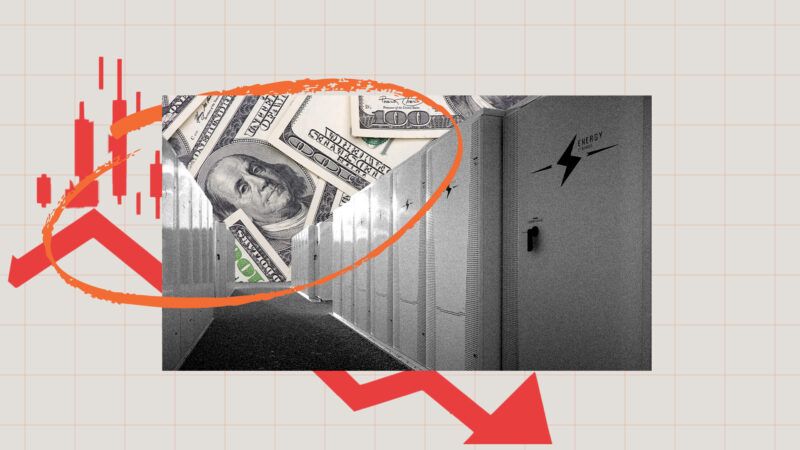Trump Administration Cancels $700 Million in Biden-Era Energy Contracts for Red States
Despite trims, the Energy Department is still wasting billions.

Earlier this month, the Trump administration announced that it would slash $7.5 billion worth of Joe Biden–era green energy projects in blue states. The cancellation of federal energy spending has now extended to Republican states, too.
On Monday, E&E News reported that the Energy Department had "canceled more than $700 million in battery and manufacturing awards" in the second week of October. This swath includes grants for "Ascend Elements, American Battery Technology Co., Anovion and ICL Specialty Products," and "glass manufacturer LuxWall," per E&E. All of these companies had plans to break ground on projects in states that voted for President Donald Trump in the last presidential election.
Ascend, the largest grant recipient of the group, specializes in creating cathodes—the positive electrode in lithium-ion batteries—out of used batteries. In 2022, the company was awarded over $316 million by the Energy Department to build a facility in Hopkinsville, Kentucky, to scale up Ascend's cathode production. Of this total, $206 million has already been spent, meaning that the Energy Department's announcement only affects a little over $110 million.
The other grantees were awarded money for similar projects. Anovion was given $117 million to build a facility in Alabama to produce synthetic graphite for lithium-ion batteries, and ICL was awarded $197 million to construct a facility in Missouri to make phosphate powder for these batteries.
American Battery Technologies, meanwhile, was awarded a $57.7 million federal grant in 2022 to develop a commercial-grade cathode material facility in Nevada. The company was then awarded $123 million in 2024 to build another facility, but this grant wasn't affected by the recent cancellation. LuxWall, the only company on the list that doesn't specialize in battery materials, lost federal funding for a vacuum-insulated window facility in Detroit, which was expected to improve energy efficiency in buildings.
The termination of these grants is a win for taxpayers. All of these projects "had missed milestones, and it was determined they did not adequately advance the nation's energy needs, were not economically viable, and would not provide a positive return on investment of taxpayer dollars," an Energy Department spokesman told E&E. The announcement builds on other spending cuts at the agency, including $5 billion worth of green energy loan cancellations in May.
While these efforts might signal fiscal restraint, federal spending has increased under Trump, and the Energy Department has traded much of Biden's green energy spending for its own wasteful initiatives. Since Trump's return to office, the federal government has taken stakes in several mineral firms, approved millions of dollars' worth of coal bailouts, continued subsidizing nuclear power, and finalized a loan for a multistate transmission line project.
Still, the administration deserves credit for the little spending it has cut. With global demand for lithium-ion batteries to power energy storage and electric vehicles expected to grow through 2030, these projects never needed the backing of the federal government to survive, a fact that is supported by American Batteries' recent Securities and Exchange Commission filing. As E&E reports, the firm said that "regardless" of whether the funding rescission is reversed, "the Company intends to move forward with the project without impact to timeline or scope."
The $700 million cut could be the tip of the iceberg. The Energy Department has reportedly outlined $20 billion worth of energy projects (including the $700 million announced) that could get the ax, but it's unclear if it'll move forward with canceling this funding. Doing so might upset the politicians who are fighting the agency on these cuts, but it would be a welcome step in reversing the government's yearslong intervention in America's energy sector.


Show Comments (18)